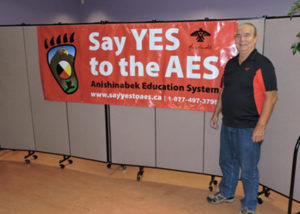‘We’re looking forward to having this ratified’ – Magnetawan First Nation Chief William Diabo on Anishinabek Education System

By Rick Garrick
MAGNETAWAN FIRST NATION—Magnetawan First Nation Chief William Diabo says his community was one of the first to sign on with the Anishinabek Education System (AES) to improve education for future generations.
“We were probably one of the pioneers in terms of signing on to this education agreement and the belief in it [and] what it can do for us First Nations,” Diabo says. “I think it’s most important to us that we have total control over what we teach our students and what they learn in our schools or what we can work towards achieving in the [public] schools.”
Diabo says it is important to teach students about the history of their First Nation as well as their language.
“We’re looking forward to having this ratified,” Diabo says.
Diabo says children in his community currently attend public school board elementary and secondary schools in Parry Sound.
“The biggest advantage of this education agreement is that we get control and we get sufficient funds to be able to operate our schools or to send our students to [public] school,” Diabo says. “It will provide the educators as well with parity in terms of salaries. We will be able to acquire [teachers] and maintain them.”
Diabo says his community has been having discussions with neighbouring Anishinabek communities about potentially building an elementary school for students from their communities.
“The number of students would probably justify us having an elementary school,” Diabo says. ”We are working together — we call ourselves the Highway 69-400 chiefs.”
Grand Council Chief Patrick Madahbee encourages community members to learn more about the Say Yes to AES campaign and to get out and vote during the Ratification Vote, which takes place from November 28 to December 2, 2016.
“This means more per-student funding,” Madahbee says. “This is for our children.”
The Anishinabek Nation has been running a Say Yes to AES campaign since November 2015. Information about the proposed agreement with Canada, fiscal arrangements and the Anishinabek Education System can be found on the website.
The benefits of ratifying the Education Agreement for communities without schools include the development of a new relationship with provincial school boards to enhance student success and well-being and the opportunity to develop and implement curriculum changes in the provincial education system. Eight other benefits are also listed on the Say Yes to AES website.
The benefits of ratifying the Education Agreement for communities with schools include having full control over all aspects of education from JK to Grade 12 and the opportunity to develop and implement Anishinabek curriculum and education standards. Eight other benefits are also listed on the Say Yes to AES website.

